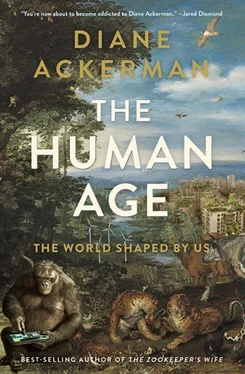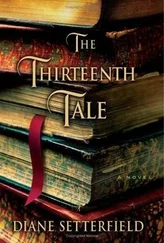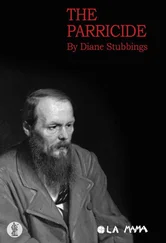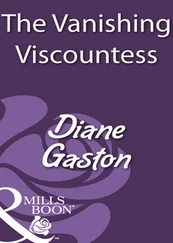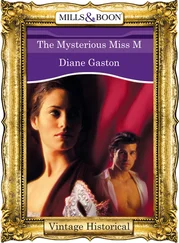It’s intriguing to imagine the role a simple microbe may play in someone’s relationships and career, and it reminds us that nothing life ever does is simple, or boring. How many threads weave a fleeting thought, let alone a hankering? It also reminds us of the fierce beauty of Earth’s organisms, whatever their size, creatures unimaginably complex, breathtakingly frail and yet sturdy, durable, filled with the self-perpetuating energy we call life. A big brain isn’t required to concoct sly, world-changing strategies.
AS I GLANCE out at the yard, I’m charmed by nature’s details: the magnolia tree’s fuzzy buds fattening up for spring; the melting snow on the lawn that’s left hundreds of grass follicles; long arcs of wild raspberry canes covered in their chalky lavender winter mask. But I’m also struck by the everythingness of everything in cahoots with the everythingness of everything else. When I look at my hand now, I scout its fortune-teller’s lines, and the long peninsulas of the fingers, each one tipped by a tiny weather system of prints; I see it whole, as one hand. But I also know that only a tenth of what I’m seeing is human cells. The rest is microbes.
When all is said and done, both our parasites and we their innkeepers are diverse—no one hosts the same reeking and scampering microbial zoo. Our microbes can change either in ratio or in kind at the drop of a cookie or in the splash from a locker-room puddle or through an ardent kiss, and then we have to adapt quickly. So it’s possible that some diseases really are inherited, but the genes that bestowed them were bacterial. When you think about it, for a major trait to evolve—something grand like the advent of language or the urge to explore—only one gene has to change on the Y chromosome of one man. That would be enough, over many many generations, to create a predisposition or a trend in an entire culture. It all depends on the highjinks of the maddening microbe.
Maybe this should also remind us how much of a pointillist jigsaw puzzle a personality really is. As a friend approaches with a smile, we greet a single person, one idiosyncratic and delightful being who is recognizable—predictable, even, at times. And yet every “I” is really a “we,” not one of anything, but countless cells and processes just barely holding each another in equilibrium. Some of those may be invisible persuaders of one sort or another: protozoa, viruses, bacteria, and other hobos. But I like knowing that life on Earth is always stranger and more filigreed than we guess, and that both the life forms we see and those we cannot see are equally vibrant and mysterious.
Where does your life story begin? When does the world start whittling your personality and casting your fate? At birth? In the womb? At the moment of conception, when DNA from your mother and father fuse, shuffling an ancient deck of genetic cards and dealing out traits at random from Mom or Dad? Long before womb-time, it would seem, much farther back, before your parents’ courtship, even before their parents’, in a crucible of choices, daily dramas, environmental stresses, and upbringing. Our genome is only one part of our saga. The epigenome is another. The birdlike microbes singing in the eaves of the body are yet another. Together, they’re offering a greatly enriched view of the terra incognita inside us. In the process, sometimes loud as headlines, but more often silent as the glide of silk over glass, how we relate to our own nature is subtly changing.
CONCLUSION:
WILD HEART, ANTHROPOCENE MIND
(Revisited)
NASA’s “Blue Marble” photograph of Earth from space gave us an eye-opening image of the whole planet for the first time. Forty years later, “Black Marble” was equally mind-altering, but in a different way: it introduced us to ourselves. Forging a new geological era, we are an altogether different kind of animal from any the planet has ever known, one able to reinvent itself and its world, and manage to survive, despite more twists and turns in daily life than any creature has ever had to juggle. We inhabit a denser mental whorl than any of our stout-hearted ancestors. We’re in the midst of a majestic Information Age, but also an ingenious sustainability revolution, a deluxe 3D revolution in manufacturing, a spine-tingling revolution in thinking about the body, a scary mass extinction of animals, alarming signs of climate change, an uncanny nanotechnology revolution, industrial-strength add-ons to our senses, a biomimicry revolution—among so many other “new normals” that we sling the phrase daily.
We understand ourselves on many more spine-tingling levels: how we’re changing the planet, other creatures, and each other. This is not just the Human Age. It’s also the age when we began to see, for the first time, the planet’s interlaced, jitterbugging ecosystems—on the land, in the air, in the oceans, in society—and unmasked our own ecosystems. We’ve met many of our makers, the mad molecules.
Thanks to revelations in neuroscience, genetics, and biology we’re bringing the life and times of Homo sapiens sapiens into a much clearer focus. As the “Me” generation gives way to the “We” generation, we’re growing more aware of the ties that bind us—even if we’re less relaxed in face-to-face encounters.
We humans have so much in common that we can’t seem to speak of comfortably: a genetic code, a niche on a small planet in a vast galaxy in an infinite universe; the underrated luxury of being at the top of our food chain; a familiar range of passions and fears; a mysterious, ill-defined evolution from creatures whose thoughts were like a vapor, and before that bits of chemical and chance so small they pass right through the mind’s sieve without its being able to fully grasp them. We have in common, despite our extraordinary powers of invention, subtlety, and know-how, an ability to bore ourselves that is so horrifying we devote much of our short lives to activities designed mainly to make us seem more interesting to ourselves. We have in common a world our senses know voluptuously, from one splayed moment to the next, the wind touching one’s chapped lips, a just-forgotten chore, the small unremarkable acts of mercy and heroism parents and lovers perform each day, the collective sort of creatures we are, whose qualities embarrass us when we stumble upon them in ourselves, but which we’re glad to epitomize in movie stars, sports figures, and politicians—people like Neil Armstrong stepping onto the moon, or Thomas Edison spending the last of his days in Florida trying to make rubber from goldenrod. We have in common a fidgeting, blooming, ever-startling universe, whose complex laws we all obey, whether we’re born in Tierra del Fuego or Svalbard.
We’re each a sac of chemicals, forged in the sun, that can somehow contemplate itself, even if we don’t always know where our pancreas is, and are troubled most days by mundaner matters. When we meet, at parties or on the street, we nonetheless feel like strangers. When we find ourselves alone together in an elevator, it is as if we have been caught at some naughty act; we can’t even bring ourselves to meet each other’s eyes.
It’s time we acknowledged our personality—not just as individuals, but as a species. I once knew a woman who checked into a hotel and, upon entering her room, decided she didn’t like the design of the small ornamental finials topping the lamps. She phoned the desk and insisted that they be changed. That may seem like radical pickiness, but our personality as a species includes wide streaks of tinkering and meddling. It’s an important part of our character; we’re unable to leave anything alone. Let’s fess up to being the interfering creatures we are, indefatigably restless, easily bored, and fond of turning everything into amusement, fashion, or toys. We Anthrops can be lumbering, clumsy, and immature. We’re also easily distracted, sloppy as a hound dog’s kiss, and we hate picking up after ourselves. Without really meaning to, we have nearly emptied the world’s pantry, left all the taps running, torn the furniture, strewn our old toys where they’re becoming a menace, polluted and spilled and generally messed up our planetary home.
Читать дальше
